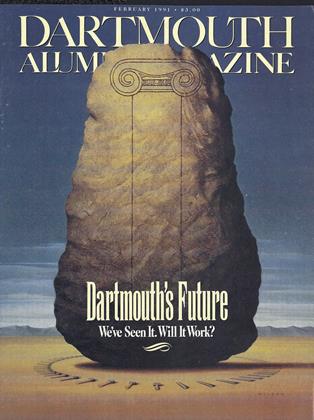THE DISCUSSION WAS WARMING UP AT THE alumni forum that gathered in New York last March to consider proposals for revising the method of electing the seven Alumni Trustees of Dartmouth College. On the podium were members of the Committee on Board Organization (CBO), charged by the College trustees to recommend how best to identify candidates for the board and provide for their election.
In the audience were some 75 alumni responding to an open invitation to discuss and critique the CBO's draft report. The podium group included two trustees; three of their colleagues had come to listen.
The warming remarks from the floor moved CBO member Susan Dentzer '77 to present a brace of questions that helped bring things into sharp focus. "Where," she asked, "is it written, and I'm asking this quite honestly, that alumni should govern the College?"
The apparent consensus that it wasnt written anywhere but was logical and proper led to her second query: "To whom does Dartmouth belong?"
In the row behind me Leo McKenna '56 spoke sotto voce to a group of his classmates: "Is that a question? Is that really a question?" A moment later, handed a microphone, he addressed the questioner: "Is that a serious question, Susan? Is there any doubt in anybody's mind? I think the College belongs to the alumni. Or as it's stated in the charge, to the present generation and the future generations of Dartmouth people. Is there any question that that is the alumni?"
Orton Hicks '21, quick to rise, interposed with some emotion: "All institutions of higher learning belong to society!"
Whereupon Avery Raube '30 leaped into the aisle to protest that he did not want society electing the people who governed Dartmouth College.
The at-odds responses were prompt evidence that Dentzer's question was by no means rhetorical. It framed, in fact, the afternoon's whole give-and-take. The varied opinions could well be regarded as an inquiry into whose proprietary interests in the College lay where, what accountability was due whom, and what divers alumni conceived the alumni role in the future of the College to be.
Chief among those issues was the CBO's accession to the demand, long voiced by many though by no means all Alumm Council groups, for a multiple slate of candidates for Alumni Trustee seats. (Ballots for the first such multiple-choice voting, adopted by the trustees, are to be mailed this month.)
The afternoon's give and take qualified Dartmouth alumni as a model, in the area of opinion, of highly contemporary characteristic—diversity. Endorsements of CBO's multiple-choice proposal ran from enthusiastic to moderate, depending on the character and number of qualifiers and caveats attached thereto.
"The apparentconsensus was thatit wasn't writtenanywhere but waslogical andproperthat the alumni shouldgovern the College
Debate over thealumni's newmethod ofnominatingtrusteesexpands into aquestion ofproprietorship.
"The newsystem isintended to putan end to costlycampaigns."
Writer Joe Boldt lives in Westport, Connecticut.
 View Full Issue
View Full Issue
More From This Issue
-
 Feature
FeatureThe End of The Story
February 1991 By Dan Nelson '75 -
 Feature
FeatureZ-Man Covers The War
February 1991 By Robert Eshman '82 -
 Feature
FeatureOUR PASSIONATE PREFERENCE
February 1991 By Joseph D. Mathewson '55 -
 Cover Story
Cover StoryNow For The Hard Part
February 1991 By Jay Heinrichs -
 Feature
FeatureIs Harvard Becoming More Like Dartmouth?
February 1991 -
 Feature
FeatureWe asked some students: WHAT ONE THING WOULD YOU CHANGE ABOUT DARTMOUTH?
February 1991
Joe Boldt '32
Features
-
 Feature
FeatureTHE MOUNTAINEERS
Jan/Feb 2013 By BROUGHTON COBURN -
 FEATURES
FEATURESNo Limits
SEPTEMBER | OCTOBER 2022 By CHRIS QUIRK -
 Cover Story
Cover StoryWhy Don't You Say Anything?"
APRIL 1997 By Davina Begaye Two Bears '90 -
 Feature
FeatureA Thinking Man's TV Journalist
June 1960 By JAMES B. FISHER '54 -
 FEATURE
FEATUREBehind the Scenes
MARCH | APRIL 2017 By Jennifer Wulff ’96 -
 Feature
FeatureEnd of a Golden era
APRIL 1982 By Shelby Grantham




